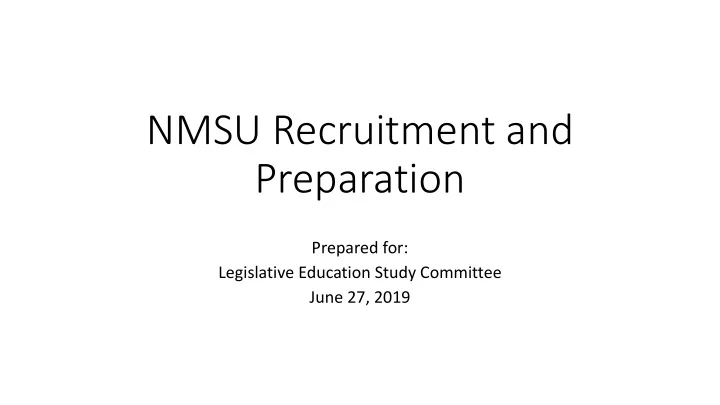

NMSU Recruitment and Preparation Prepared for: Legislative Education Study Committee June 27, 2019
Teacher Education Program (TEP) • Dr. Blanca Araujo – Director of Teacher Education Program • baraujo5@nmsu.edu • 575-646-1282 • Dr. Lynn Bagwell – Clinical Director of Early Childhood Education • lynnb@nmsu.edu • 575-646-1537 • Dr. Leanna Lucero – Clinical Director of Elementary Education • leannal@nmsu.edu • 575-646-2205 • Dr. Tracey Gorham Blanco – Clinical Director of Secondary Education • tgblanco@nmsu.edu • 575-646-4161 • Dr. Cecilia Hernandez – Clinical Director of Alternative Licensure Programs • cecimh@nmsu.edu • 575-646-1256 2
Early Childhood Education 4 PATHWAYS FOR STUDENTS Undergraduate Major in Early Childhood Education – Licensure Undergraduate Major in Early Childhood Education – Non-Licensure NEW Alternative Licensure Graduate Level Certificate • 21 credits • Must be a teacher of record in PreK-3 rd classroom in public school setting • Can pursue Master’s Degree with 12 additional credits NEW Master’s + Licensure • 45 credits Developed through NMPED Recruitment & Retention Grant, Spring 2019 3
Elementary Education 3 PATHWAYS FOR STUDENTS • Undergraduate Program – Major in Elementary Education • Two semesters of practicum (over 300 hours) – K-2 nd and 3 rd –5 th • 30 credit hours of methods-based coursework • Full semester of student teaching prior to graduation • Bilingual/TESOL endorsement • Graduate Program – Master’s Plus Licensure in Elementary Education • Two semesters of practicum (about 200 hours) – K-2 nd and 3 rd –5 th • 15 credit hours of methods-based coursework • Full semester of student teaching prior to graduation • NEW Graduate Program – Master’s Accelerated Program in Elementary Education 4
Secondary Education 4 PATHWAYS FOR STUDENTS • Undergraduate Programs • Major in Secondary Education • 120 credits with concentrations in Math, Science, Social Studies, English Language Arts • NEW Minor in Secondary Education – developed through NM-PED Recruitment and Retention Grant, Spring 2019 • 27 credit Minor for Math, Sciences, Social Sciences, and English majors • Graduate Programs • NEW Masters Accelerated Program • Students can get a head start on their Masters by taking 12 credits while still undergrad • Masters in Education Plus Secondary Licensure • 39 credits leading to licensure 5
Alternative Licensure Programs • Elementary Education - 21 credit hours (f2f) • Secondary Education - 18 credit hours (f2f) • Special Education - 21 credit hours (online) • Requirements for all programs • Teacher of record while in the program • Graduate School admissions • Maintain 3.0 in all required courses • 2 concurrent semesters of supervision / classroom observations (10 total) • Pass all state required licensure exams 6
Teacher Residency Grant Proposal • Proposed partnership with GISD to develop Teacher Residency Program • Bilingual Education – Elementary • Special Education – Elementary • Residency Seminar Support for new Alternative Licensure Teachers • Mentor teachers leading seminar • Collaboration across Bilingual and SPED departments • Support for testing requirements, travel to conference, stipend for participation 7
Near-Peer Mentoring Program • Educators Rising Near-Peer Mentoring Pilot Program • Development and implemented during Spring 2019 as part of the NM-PED Recruitment and Retention grant • 17 NMSU Mentors • 48 HS Mentees at 4 local high schools • Near-Peer Mentorship • is characterized by the pairing of individuals who are slightly more advanced in learning and / or training with individuals who are less advanced (Trujillo et al., 2015). • It is a dynamic reciprocal relationship that benefit both mentors and mentees where they are viewed as ‘learners and trainees’ (Trujillo et al., 2015). • Reinforces the pipeline of professionals by providing a continuum of learning opportunities for those interested in pursuing our teaching profession • Creates a sense of belonging to a professional community and improves self- efficacy. 8
Questions • Let us know your questions 9
Recommend
More recommend